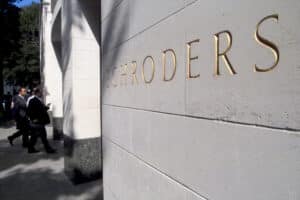Schroders China Opportunities Review – that will be the topic of today’s article.
Explore the Schroders China Opportunities and how they compare to St. James’s Place.
Nothing written here should be considered as financial advice, nor a solicitation to invest.
For any questions, or if you are looking to invest as an expat, you can contact me using this form, or via the WhatsApp function below.
Introduction
Schroders plc is a British multinational asset management company founded in 1804. The company employs over 5,000 people worldwide in 32 offices in Europe, America, Asia, Africa and the Middle East. The company, headquartered in the City of London, is listed on the London Stock Exchange and is listed on the FTSE 100 index.
Schroeders bears the name of the Schroeder family, the famous Hanseatic family of Hamburg with branches in other countries. The Schroeder family controls 47.93% of the company’s common stock through trusts, private ownership, and charitable foundations.

The history of Schroders began in 1804 when Johann Heinrich Schroeder (John Henry) became a partner in the London firm of his brother Johann Friedrich (John Frederick). J. Henry Schröder & Co. was founded in London in 1818.
During the American Civil War, Schroders “issued £ 3 million in bonds for the Confederation in 1863.”
Key business developments include the creation of J Henry Schroder Banking Corporation (“Schrobanco”) as a commercial bank in New York in 1923, the public offering of J. Henry Schroder & Co. Ltd. on the London Stock Exchange in 1959, and the acquisition of Helbert, Wagg & Co, a leading issuer, in 1962.
In 1986, the company sold Schrobanco, its New York-based commercial banking division, and acquired 50% of Wertheim & Co., a mid-tier New York investment bank that more closely mirrored London business.
Schroeders played a leading role in the privatizations carried out by the UK government in the 1980s, and under Winfried Bischoff the numbers were set to skyrocket. Schroders was worth £ 30 million when he took over as CEO in 1984; in 2000, the company sold its investment banking division to Citigroup for £ 1.3 billion. Citigroup’s European investment banking arm traded as Schroder Salomon Smith Barney from 2000 to 2003.
In 2013, Schroders acquired Cazenove’s wealth management division for £ 424 million. Schroders bought Sandaire’s London investment office in September 2020.
Wealth management at Schroders
Wealth management is the core business and strategic priority of the Schroders Group. Together, they look after the £ 65.7 billion worldwide assets of their clients, drawing on Schroders’ international investment expertise and offering personalized and impartial advice.
The company provides a full range of services to help you achieve the goals and ambitions from offices in the UK, Channel Islands, Switzerland, Singapore, and Hong Kong. Investment value and income are not guaranteed. Investors may not return the originally invested amount.
Schroders China Opportunities Fund
The fund aims to provide capital gains above the MSCI China Index (Net TR) after fees deducted over a period of three to five years by investing in shares of Chinese companies. The purpose of the fund is to invest heavily in Schroder ISF China Opportunities, the investment objective of which is to generate capital growth primarily through equity investments and equity-related securities of companies whose headquarters and/or are listed on or have significant business operations in the People’s Republic of China.
In case you are interested in the Schroders China Opportunities Fund, and you want to invest in the Chinese companies, click here and check out the form that we provide. We will help you achieve your financial goals.
Performance overview
– Chinese equities were one of the weakest markets in Asia during this period as investors feared new lockdown restrictions would be introduced. Hong Kong also ended the quarter with negative territory.
– The fund showed negative performance but surpassed the benchmark (MSCI China (NDR)).
Fund efficiency drivers
– At the sector level, positive stock selection has been a key driver of the fund’s relative performance. Almost all industries have contributed especially materials and information technology.
“At the country level, both stock selection, especially Chinese stocks, and country allocations, in particular overweight Hong Kong stocks, contributed to the results.
– At the stock level, positions in HSBC and Prada showed the best relative performance, and positions in Pinduoduo showed the best relative performance.
– The biggest detractors were Zylox-Tonbridge Medical Technology and Miniso Group, as well as zero weight in NetEase.
Risk considerations
- Counterpart risk: The Fund may have contractual agreements with counter parties. If the counterpart cannot fulfill its obligations, the amount that it owes to the fund may be lost in part or in full.
- Concentration Risk: A fund may be concentrated in a limited number of geographic regions, industries, markets and / or line items. This can lead to large changes in the value of the fund, both upward and downward.
- Derivative risk – effective portfolio management:
- Derivatives can be used for efficient portfolio management. A derivative may not perform as expected, may result in losses in excess of the value of the derivative, and may result in losses for the fund.
- Emerging Markets and Border Risk. Emerging markets, and especially borderline markets, tend to carry greater political, legal, counterpart, operational and liquidity risk than developed markets.
- Higher risk of volatility: The price of this fund may be volatile as it may take higher risks in search of higher rewards.
- IBOR Risk: The transition of financial markets from the use of interbank offering rates (IBOR) to alternative reference rates could affect the valuation of certain assets and disrupt the liquidity of certain instruments. This can affect the investment performance of the fund.
- Liquidity risk: in difficult market conditions, the fund may not be able to sell a security at full price or even sell at all. This could affect the results of operations and cause the fund to postpone or suspend the buybacks of its shares.
- Market risk: the value of an investment may increase and decrease and the investor may not be able to return the original investment.
- RMB foreign exchange risk on land: The fund may be exposed to risk in various currencies. Changes in exchange rates can lead to losses. Foreign exchange control decisions made by the Chinese government could affect the value of the fund’s investments and cause the fund to postpone or suspend the buybacks of its shares.
- Operational risk: possible failures in operational processes, including those related to the safety of assets. This can lead to losses for the fund.
- Performance risk: Investment objectives express the intended result, but there is no guarantee that such a result will be achieved. Depending on market conditions and the macroeconomic environment, achieving investment goals may become more difficult.
- Equity risk: The fund may invest in China “A” shares through Shanghai-Hong Kong Stock Connect and Shenzhen-Hong Kong Stock Connect, which may involve clearing and settlement, regulatory, operational and counterpart risks.

Information on benchmarks and corporate actions
Some differences in performance between the fund and the benchmark may arise because the fund’s performance is calculated at a point of assessment other than the benchmark. The fund’s performance should be measured against its target benchmark, which should be higher than the MSCI China Index (Net TR), and compared to the Morningstar China stock category.
The fund’s investment universe is expected to overlap to a limited extent with the components of the target benchmark. The comparator benchmark is included for performance comparison purposes only and has nothing to do with how the investment manager invests the fund’s assets.
The investment manager invests as he sees fit and there is no limit to the extent to which the portfolio and fund performance may deviate from the target. The investment manager will invest in companies or sectors not included in the target to take advantage of specific investment opportunities.
The target benchmark was chosen because it represents the type of investment the fund is likely to invest in and is, therefore, an appropriate target for the return the fund seeks to generate. The benchmark was chosen because the investment manager believes that the benchmark is a suitable benchmark for performance purposes, given the investment objective and policy of the fund.
Pros of investing in mutual funds
Professional portfolio management
The customized portfolio is managed by seasoned industry professionals with expertise in the field. They continually manage your portfolio to help you get the most out of your investment.
Availability
You can buy mutual funds of smaller denominations, ranging from $ 100 to $ 1000. Smaller mutual fund denominations allow investors to make recurring investments as part of their regular monthly buying plans. Instead of waiting for enough money to buy more expensive investments, you can invest in mutual funds right away.
Diversification
Mutual funds can invest in securities of various asset classes such as bonds, commodities, or cash. This helps to diversify the portfolio. If one sector is performing poorly, there is a high likelihood that other sectors will make up for the loss.
Accessible
Investing in mutual funds is very affordable as an individual can invest from as little as $10 every month to a mutual fund. There is no fixed amount that can be invested. Thus, even a small investor can participate in the market by investing in mutual funds.
Liquidity
All it takes to exit a mutual fund is one instruction to your broker/agent to sell it. Funds are returned to your account within 48 hours.
Pained by financial indecision? Want to invest with Adam?
Adam is an internationally recognised author on financial matters, with over 352.9 million answers views on Quora.com and a widely sold book on Amazon



